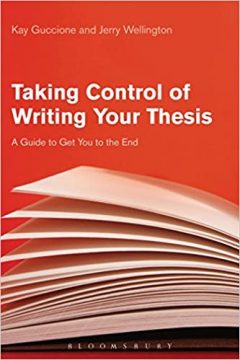Review: Taking Control of Writing Your Thesis

Taking Control of Writing Your Thesis
A Guide to Get You to the End
By Kay Guccione and Jerry Wellington
Bloomsbury Academic, 2017
Taking Control of Your Thesis by Kay Guccione and Jerry Wellington begins with a discussion of the different models informing how doctoral training is done. In the old model, all facets of doctoral training are determined by the close relationship formed between the supervisor and the doctoral candidate. While this model involves figuring out the secrets of this relationship and managing its idiosyncratic nature, the new model requires the doctoral candidate to assume control of the process and build the capacity to draw on a network of individuals both within and outside the university.
The authors align themselves with the new model. This explains why their book is influenced by the paradigm of coaching rather than by the traditional guidebook structure which tends to lean heavily on technical tips and clearly delineated steps. After all, while the thesis project is a collaborative venture, it is you who should take control of your thesis process.
If so, what does “taking control” entail? Broadly speaking, taking control of one’s own thesis means understanding each step conceptually, reflecting on it critically, and drawing on the experience and knowledge of a wide network of mentors to improve practices. In short, Taking Control of Your Thesis shows you how all that works through an examination of the thesis process, an examination which maps out the different considerations, the different approaches and expectations individuals bring to it.
The consideration and approaches include using the tools of project management to bring your thesis under control—setting goals, determining milestones, getting stakeholders on board, and so on. Other considerations relate to the processes of writing and thinking as well as the processes of reading and writing. Because writing is a form of thinking, for instance, these processes should not be treated as distinct activities but as “partner processes.” In other words, you should not have to “finish” thinking before you start writing. Reading and writing, on the other hand, are “joint functions” which means reading never fully stops until the writing is completely done. Sometimes you do have to devote the bulk of your time for writing, but you should keep reviewing the literature up to the very last minute.
In addition to illuminating ways of thinking about the thesis process and its components, Taking Control of Your Thesis provides specific tools and insights. These include insights about finding and recruiting mentors, starting writing groups, examining the literature, coaching oneself, negotiating the feedback process, as well as dealing with challenges such as feeling “stuck,” isolation, burnout, and anxiety.
Writing a thesis requires understanding its components and reflecting on one’s own practices. Taking Control of Your Thesis can help you on both fronts.